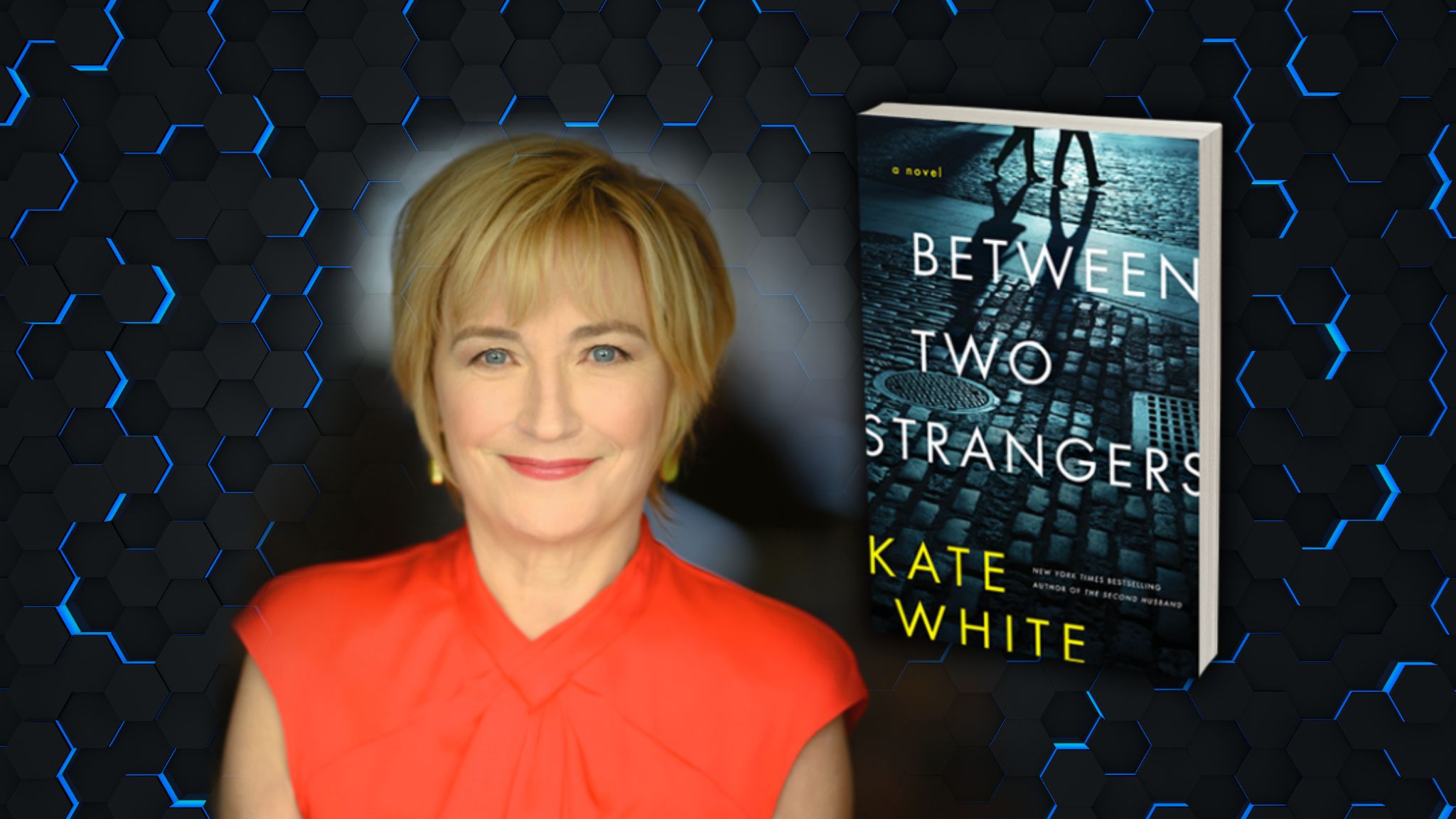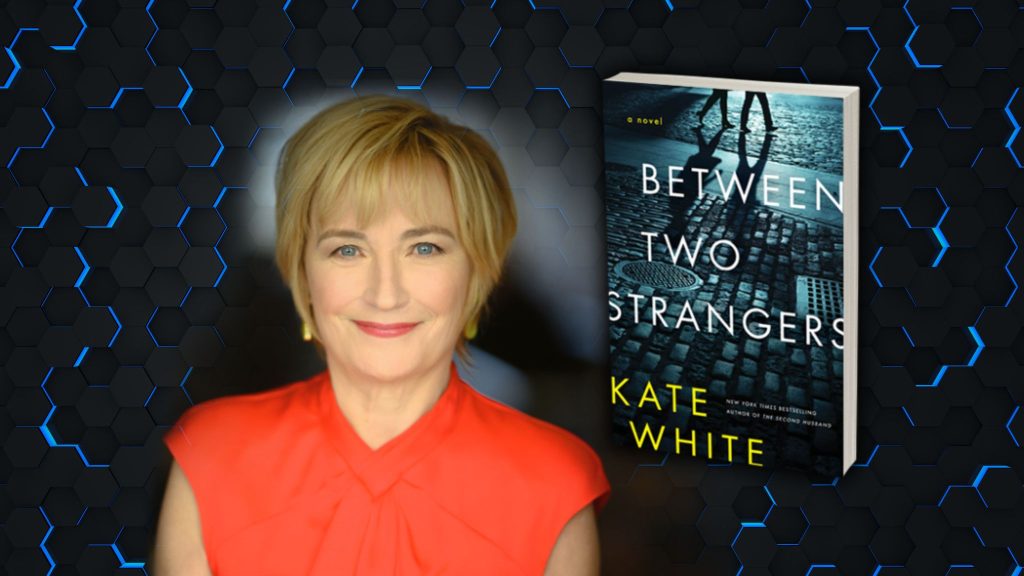
A stranger leaves you $3.5 million in his will — do you take the money and run? Or do you assume it’s a mistake and fork over the cash when someone comes looking for it?
Regardless of your knee-jerk response here, the answer may not simply come down to which way your moral compass tilts.
In author Kate White’s 17th novel of suspense, Between Two Strangers, that moral ambiguity is precisely what’s on struggling artist Skylar Moore’s mind when she receives a dubious call from a lawyer informing her that she has inherited $3.5 million — from a stranger. Well, not a complete stranger. Twelve years prior, Skylar and the man had a one-night stand. They’d had a good time, of course, but she doesn’t even remember his last name, let alone why he’d include her in his will.
Though Skylar is not destitute — she’s doing okay as a collage artist, thank you very much — the money would secure her ability to keep making art, and would also help her realize her dream of having a child. And anyway, she isn’t doing anything wrong by accepting the money … .he clearly wanted her to have it.
But soon after she takes the cash, Skylar learns there are a number of people who believe she isn’t entitled to that money after all — and will stop at nothing to get it back. If she wants to keep the millions and stay alive, Skylar knows she must figure out the truth behind why it was left to her. But when she turns to her art to help her remember details of that night, she learns that the inheritance could be tied to a tragic event from her past she has desperately tried to block from her mind.
In this interview with BookTrib, Kate White talks more about her riveting new novel of suspense, which she admits was inspired by an eerie experience close to home.
I’m sure many of us have dreamed about coming into money — a surprise inheritance from a long lost relative, winning the lottery, or finding treasure behind the walls of a home renovation project. Few, perhaps, would anticipate receiving millions of dollars from a stranger. I’d love to know more about what inspired this book.
My family had this weird experience when my mom died several years ago. My brother, who was the executor of her will, was trying to track down one of the checks from one of her IRAs, and we realized it had gone to a woman whose name we didn’t recognize. As we were trying to find out who she was, we had a lot of questions. Did Mom have a secret life? A daughter none of us knew about, maybe?
After a few weeks of being anxious, one of my brothers realized the woman had the last name of one of our relatives who had been married a few times. He called her and she admitted she had received the money — she’d used part of it to renovate her apartment and given the rest to charity. We were shocked. We asked her, ‘how could you do that? You know Mom had memory issues late in life. Didn’t you think this was a mistake?’ She said no, that my mom had always liked her and she assumed the money was for her.
Soon after, the bank admitted they’d made a mistake and refunded the money to us. But it got me thinking — what if it hadn’t been a mistake? What if I was left money by someone unexpectedly? Would I keep it?
Ultimately, your protagonist Skylar Moore does. I love how she comes to this decision — the money would afford her the ability to keep doing art, and would allow her to have a child. What made these motivations appealing to you as you wrote her character?
When I did the research on how much it would cost her to have a child, I was appalled. The price of the artificial insemination is just one factor — that’s before you add any “extras” in. And what if it didn’t take the first time? She may have needed to go to the next step… She can’t afford any of that on what she makes as an artist. And once she realizes who gave her the money, she doesn’t see it as her role to give the money back.
Some of the other characters in the book would certainly disagree — and that puts Skylar in serious danger.
When you think about what motivates someone to kill, the list isn’t all that long. Sexual jealousy. Greed. Greed is the big one. But what I wanted to do with this book is make sure I was writing it in a way that wasn’t the usual way thriller writers deal with greed when someone kills for money. I had a lot of fun with this one.
I can tell! It’s a fast-paced read with a lot of twists and turns, while also doubling down on some familiar themes. This is not the first time you deal with memory loss in a novel, nor the theme of guilt, both of which are threaded throughout this story. Can you share a little about what role these themes play in the book?
When I started writing this book, I didn’t go into it thinking that a lot of people were going to be guilty, but there are a lot of reasons the characters do feel guilty — including Skylar. I did a lot of research on memory too — what things trigger memories — and I learned that sensory details intertwine with the part of our brain that processes emotion and memory. So because Skylar is a visual person, she puts together a collage to help her try and remember that night.
Speaking of that, I became fascinated by “collage” art when I read the book. I had to look it up to see some examples, and of course there are some famous artists who have done collage art, such as Picasso. Why did you land on this as her career?
A lot of my characters have had jobs somewhat related to what I have done in my past. Journalists. Celebrity biographers. People involved in marketing. I worked with researchers for many years when I was editor-in-chief at Cosmopolitan. But I had started to run out of ideas. I do collect art, and I love collage art. I read one review of the book online where the reader said after finishing the book, they wanted to try collage art. I love that. It can be very therapeutic.
For Skylar it’s more than that, especially as she’s trying to uncover the truth about why she was given the money. It almost acts like her “murder board,” the kind you might see on Criminal Minds.
Exactly. You can see as she builds it how her memories start to surface.
Absolutely. Skylar is such a strong character, despite falling somewhat into that “starving artist” role. Readers familiar with your books won’t be surprised—strong female characters are a hallmark of your work. It’s how I see you as well. Accomplished. Confident. Inspiring. Is this what draws you to these kinds of characters?
Yes, I think so. Because even though I’ve had moments in my life where I’ve had the wind knocked out of my sails, I had a fabulous mom and grandmother who taught me to be confident. So much so, I find it hard to write about women who are train wrecks.
Kate White is the New York Times bestselling author of 17 novels of suspense: nine standalone psychological thrillers, including The Secrets You Keep, The Second Husband, and Between Two Strangers (May ‘23), and eight Bailey Weggins mysteries.
For 14 years Kate served as the editor-in-chief of Cosmopolitan, which under her became the most successful magazine in single copy sales in the U.S. Though she loved her magazine career, she decided to leave ten years ago to concentrate full-time on another passion: writing suspense fiction.
Kate is an avid traveler and birdwatcher and enjoys spending each winter with her husband at their home in Uruguay.
RELATED POSTS:
Multi-Million Dollar Inheritance Left by a Stranger Causes a Deadly Past to Resurface

